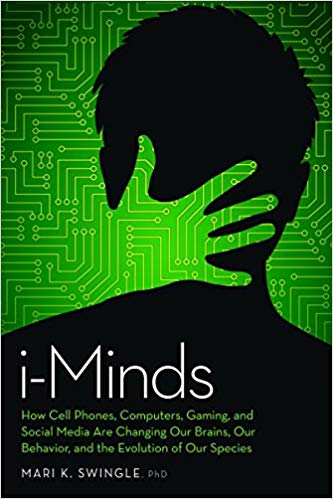i-Minds by Mari Swingle

A child with many gifts at Christmas time will typically unwrap all of them before focusing for a long time on any one gift in particular. Modern i-technologies (internet, cell phones, video gaming, social media etc) create a similar situation, one in which the pile of unwrapped gifts never runs out.
With i-tech, there is always novelty and always more to explore. i-tech’s endless content and endless choices are mesmerizing and enthralling. As with gambling, what hooks people is not the outcome, but rather the thrill of the hunt and the anticipation of a reward.
Many people tune in to their i-tech devices without any goals for how they will spend their session. Many people then stay aimlessly absorbed in i-tech long after they have finished whatever they had originally set out to do. Even a meaningless i-tech session usually feels meaningful at the time. The pull of the offline world is too weak to force an end to the session.
Excessive i-tech usage puts the brain in a constant state of over-arousal. An over-aroused mind is easily bored and easily irritated. Over-arousal disables the brain’s ability to engage in creative or innovative thought, leaving it to resort to rote and reactionary stress responses. Chronic over-arousal also makes it harder for the brain to slow down and fall asleep; when sleep happens, it can be shallow and non-restorative. Over-aroused people, even when they are unhappy, typically don’t want to calm down; they consider themselves to be in a productive state of mind and will double down on stimulation by seeking out even more of it.
People with good mental health are typically able to successfully integrate i-tech into their lives, using it constructively and in moderation. For people with mental health vulnerabilities such as predispositions to anxiety or depression, i-tech addiction is a real possibility. For people with mental health struggles, superficially-rewarding activities like gaming, pornography, shopping, or research may temporarily quell their symptoms. However, since the offline world doesn’t get any better as a result of such efforts, people can end up getting drawn back into i-tech as a place of refuge, creating a vicious cycle.
Children are getting exposed to i-tech at increasingly young ages; parents have discovered that i-tech is great at temporarily keeping their kids occupied and well-behaved. i-devices are least socially interactive of all toys. A healthy child-parent relationship, especially in early childhood, requires frequent child-parent emotional “check-ins” and feedback. Much of a young child’s learning about the world comes from gauging their parents’ reactions to various things. However, since i-devices are so all-absorbing, children and parents won’t take notice of each other when the child is using the i-device. If this happens frequently enough, a healthy and secure attachment between child and parent will not develop; the child may project attachment onto the i-devices instead. Children who fail to establish a secure emotional attachment with their caregivers in early childhood usually develop either a clingy or an avoidant attachment style, harming their interpersonal relationships at school-age and beyond.
i-tech has been making inroads into the education sector. Children need lots of time for unstructured and self-directed play in order to make sense of their world. However, all i-tech - including video games meant to be educational - are inherently structured and pre-programmed, offering little room for a child’s creativity. Unstructured playtime for children is already on the decline because of the rise of extracurricular activities and ever-earlier preschools; i-tech adds a new front to an already-troubling trend.
The current stereotype of an “internet addict” is a 20-something Millennial male who is still living with his parents and is “failing to launch”. Vulnerable but often-overlooked demographics for i-addiction include aging Baby Boomers who are transitioning into the new digital world and young Generation Z children who have never known any other world.
